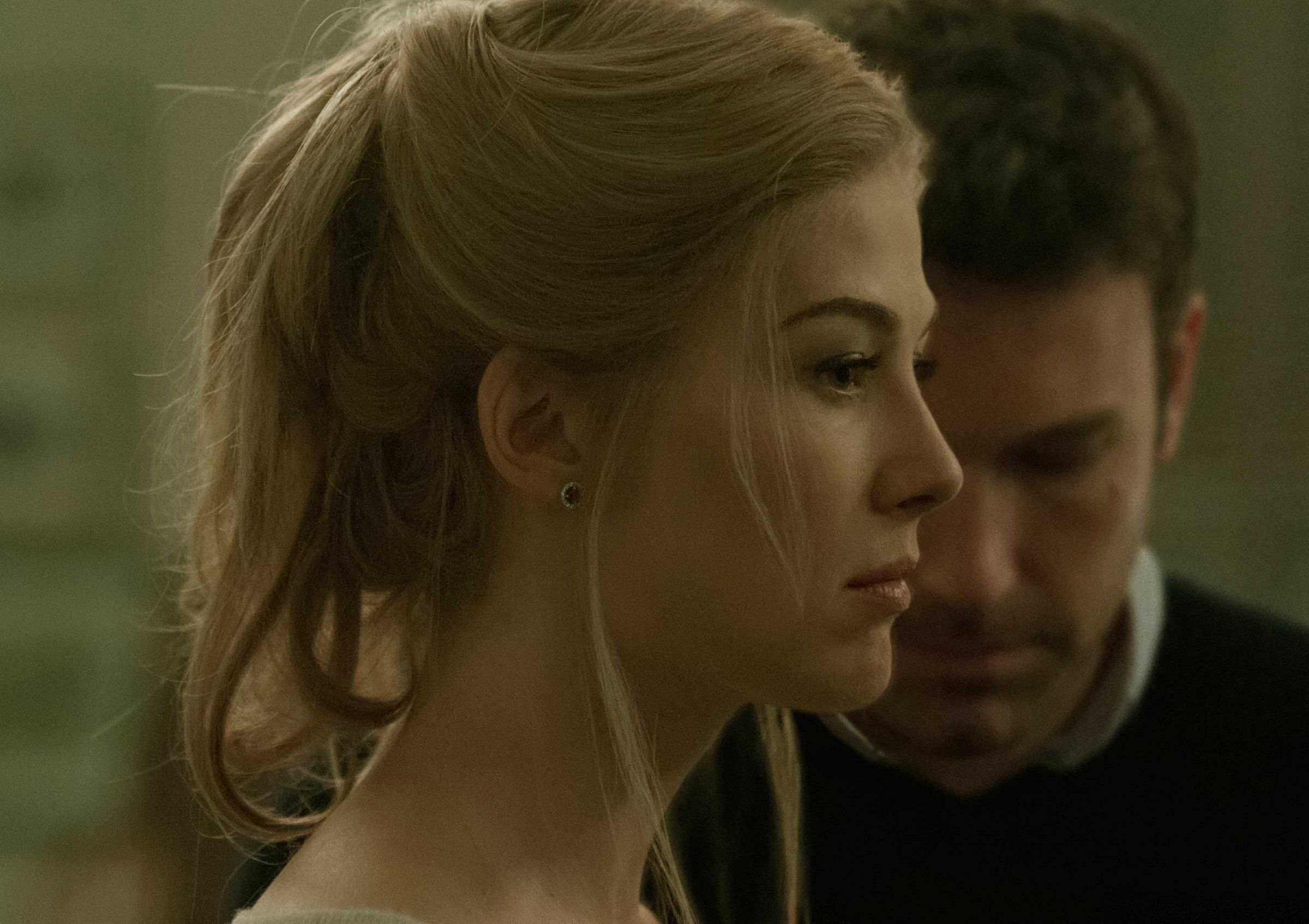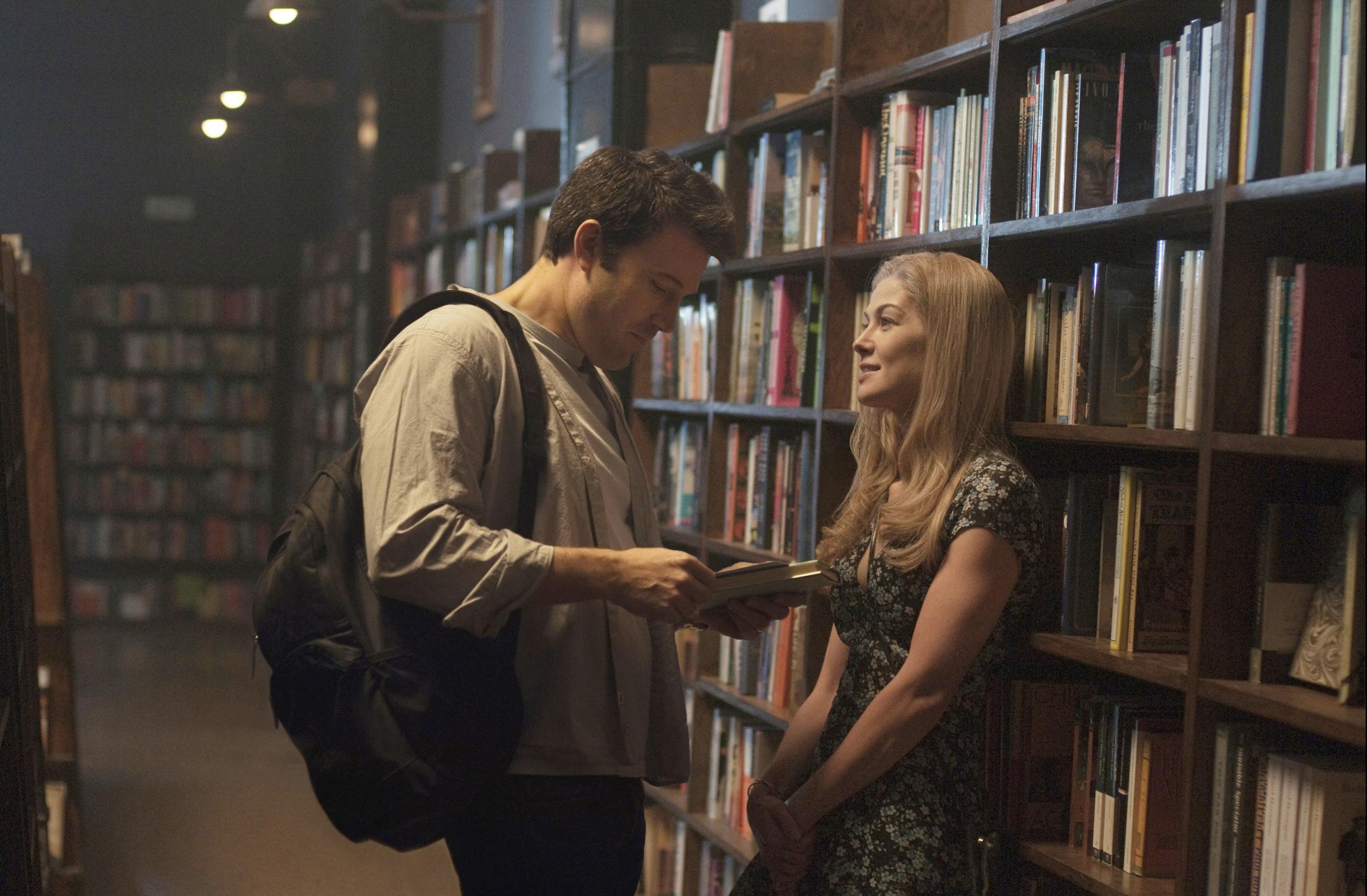
This post contains spoilers for the Gone Girl movie and book.
The highly anticipated film adaptation of Gillian Flynn’s Gone Girl is out, and nobody can agree if it’s a sexist portrayal of a crazy woman or a feminist manifesto. The answer is it’s both, and that’s what makes it so interesting.
The story of Gone Girl pits a feminist psychopath against a misogynist jerk in what might be the world’s most twisted marriage. When the wife, Amy, sets up her philandering husband, Nick, for her murder, the two characters vie for the reader’s sympathy, lying and manipulating one another in order to survive. Most would agree that Amy is the “worse” spouse: she’s smarter, stronger and willing to commit murder. But while some argue that a conniving character like Amy only gives women a bad name, ultimately Flynn and director David Fincher created a female role more complex than the women usually seen in blockbuster films.
(REVIEW: Gone Girl Plays a Fatal Game of Love and Marriage)
At the heart of this debate is the “Cool Girl” speech that Flynn penned originally for the novel and adapted for the screenplay. Those who saw Gone Girl this weekend without having read the book were probably utterly confused about why, as Amy is making her getaway, she goes on a rant about women who try to become the “Cool Girl” in order to please men.
Though the movie cuts much of the time Amy pretends to be the Cool Girl at the beginning of her relationship with Nick, the first half of the book is dedicated to establishing this very specific persona. According to Amy, the Cool Girl is a woman who pretends to like what men like in order to attract attention. She’s the type of girl who unabashedly loves sex and drinking beer and eating burgers — while still miraculously maintaining a perfect figure — and is always ready to forgive her husband’s foibles. The speech struck a chord, becoming a major topic of discussion that’s been reignited with the release of the film. Here’s a portion of the passage:
That night at the Brooklyn party, I was playing the girl who was in style, the girl a man like Nick wants: the Cool Girl. Men always say that as the defining compliment, don’t they? She’s a cool girl. Being the Cool Girl means I am a hot, brilliant, funny woman who adores football, poker, dirty jokes, and burping, who plays video games, drinks cheap beer, loves threesomes and anal sex, and jams hot dogs and hamburgers into her mouth like she’s hosting the world’s biggest culinary gang bang while somehow maintaining a size 2, because Cool Girls are above all hot. Hot and understanding. Cool Girls never get angry; they only smile in a chagrined, loving manner and let their men do whatever they want. Go ahead, shit on me, I don’t mind, I’m the Cool Girl.
Men actually think this girl exists. Maybe they’re fooled because so many women are willing to pretend to be this girl…Oh, and if you’re not a Cool Girl, I beg you not to believe that your man doesn’t want the Cool Girl. It may be a slightly different version—maybe he’s vegetarian, so Cool Girl loves seitan and is great with dogs; or maybe he’s a hipster artist, so Cool Girl is a tattooed, bespectacled nerd who loves comics. There are variations to the window dressing, but believe me, he wants Cool Girl, who is basically the girl who likes every f***ing thing he likes and doesn’t ever complain. (How do you know you’re not Cool Girl? Because he says things like “I like strong women.” If he says that to you, he will at some point f*** someone else. Because “I like strong women” is code for “I hate strong women.”
When I first read the Cool Girl speech, I nodded my head. Out of context it contains a lot of truisms, and I identified with the pressure to pretend to be someone else at the beginning of a relationship. (A pressure, which Amy later points out, men do not feel, otherwise we’d see a lot of boyfriends learning to knit and pretending to like girly drinks to impress their girlfriends.) At one point early in the book, Cool Girl Amy writes about a time Nick ditches her, her friends and their husbands in order to play poker. He doesn’t call and doesn’t text. When Amy arrives home she embraces him and tells him it’s OK. It’s a move that I’ve seen many female friends make: pretending like they don’t care when their boyfriends don’t show up. They do care, and it will most likely become fodder for a fight later.
(MORE: Gone Girl Bests Annabelle at the Box Office)
So why pretend to not care? Because the Cool Girl has become so mainstream that some men have come to expect every girl to be the Cool Girl. Flynn says that she was inspired by Cameron Diaz in There’s Something About Mary, but there are many other versions in pop culture. She’s the girl who drinks beer with the guys (Katie Aselton in The League, Olivia Wilde in Drinking Buddies). The girl that will like your nerdy hobbies because you like them (Summer dressing up as Super Woman on The O.C., Rachel fulfilling Ross’ Princess Leia fantasy on Friends). The girl who doesn’t want commitment (Natalie Portman in No Strings Attached, Zooey Deschanel in 500 Days of Summer). The girl who swears and talks about eating pizza and can be described as “chill” (Chrissy Tiegan and Jennifer Lawrence on the red carpet) — oh yeah, and she’s always hot.

Amy does touch on a fundamental problem with the way men and women interact. While Amy was pretending to be the Cool Girl, Nick was pretending to be what I’ll dub the Charming Guy. This is how men and women court each other: they pretend to be something they are not. Optimistically, it can be described as trying to be your best self for the person you love. For pessimists, it’s called faking it. “But it was unsustainable,” Amy writes. “It turned out he couldn’t sustain his side either: the witty banter, the clever games, the romance, and the wooing. It all started collapsing on itself.”
But then I remembered these words that rang so true were being uttered by a woman who lied about being sexually assaulted multiple times, set her husband up for murder and killed someone herself. And that makes things complicated.
It makes us squirm to agree with someone who just might be a psychopath. Even if her assertions are true — women shouldn’t allow themselves to be trampled — her rationale is harder to endorse: “I don’t get it: If you let a man cancel plans or decline to do things for you, you lose.” Does the fact that Amy gives the Cool Girl speech turn her ideas into the mere rantings of a lunatic? If so, it’s easy to cast Flynn as a misogynist who sees women as bitter and vengeful. The takedown of the Cool Girl then becomes not a feminist piece of criticism but evidence for those who think all feminists are angry and crazy.
(MORE: This Case Is the Real-World Version of Gone Girl)
Gillian Flynn told TIME’s Lev Grossman that she’s been accused of misogyny because of Amy’s evilness. Amy fakes a sexual assault, even though overwhelming evidence indicates that women don’t lie about being raped. She manipulates men to an exaggerated and terrifying degree (like faking a pregnancy), saying reasonable things despite being a murderous madwoman. Her vengeance is utterly feminine. In short, it would be easy for someone to see the movie and reduce its message to “bitches be crazy.” She’s a men’s rights advocate’s worst nightmare.
(This is less true of the book, where Nick becomes a feminist’s worst nightmare: he visits strip clubs on their third wedding anniversary, cheats and struggles with an urge to commit violent acts against any woman who disagrees with him. This and Nick’s latent misogynist thoughts — a “stupid bitch” mumble he inherited from his father — are largely missing from the movie. But before we accuse David Fincher of sexism himself, note that the director shows Nick slamming Amy’s head against the wall after she tells him she’s pregnant, a scene which drew an audible gasp from the theater I was in even though Affleck calling her a “bitch” drew laughs minutes before.)
What Gillian Flynn is doing is also extremely feminist. Because there are so few strong women in literature (or TV shows or movies) the burden falls on the writers who do write about women to make them represent all of womanhood. And that’s simply not fair. We should have all sorts of women in our novels — just as we have all sorts of men. Very few writers are creating complex, evil female characters with interesting motivations. Gillian Flynn is. It seems sexist to assert that female characters ought to be, at their core, loving and good.
Which brings us back to the “Cool Girl” speech and the inherent ickiness of liking something a devil has said.
(MORE: The 13 Biggest Differences Between the Gone Girl Movie and Book)
I think Flynn likes that complication: she and Fincher have constructed a movie that forces the audience to debate and pick apart its gender dynamics. There’s no question that Amy is a monster when she slashes Desi’s throat during sex or when she fakes her death to trap Nick. But she does these things to rebel against the boxes others have tried to put her in — “Amazing Amy” by her parents, “Cool Girl” Amy by Nick, beautiful and doting Amy by Desi. It’s an extreme form of rebellion, but an interesting meditation on society’s expectations of women nonetheless. The fact that audience members could answer the question, “who is most sympathetic in the film?” in several different ways is in and of itself an endorsement of the movie.
And no, you’re not a bad person if you agree with Amy about the Cool Girl. Psychopaths are smart. Her conclusions are valid. It’s just her resultant actions that are problematic. So maybe don’t use it as a justification for murder.
More Must-Reads From TIME
- The 100 Most Influential People of 2024
- The Revolution of Yulia Navalnaya
- 6 Compliments That Land Every Time
- What's the Deal With the Bitcoin Halving?
- If You're Dating Right Now , You're Brave: Column
- The AI That Could Heal a Divided Internet
- Fallout Is a Brilliant Model for the Future of Video Game Adaptations
- Want Weekly Recs on What to Watch, Read, and More? Sign Up for Worth Your Time
Write to Eliana Dockterman at eliana.dockterman@time.com